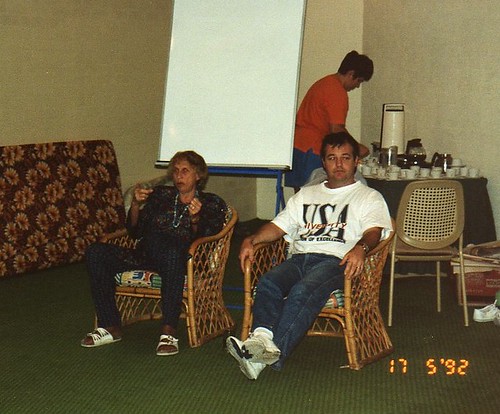Prominent influences in my professional development as a psychotherapist
Early to mid 20s - Psychology at university
Cognitive behavioral therapy
Psychology as an empirical science
Early to mid 20s
Transactional analysis and Gestalt therapy - Bob and Mary Goulding
Psychoanalytic approach to child psychotherapy - Julia Solomon
Late 20s - early 30s
Gestalt therapy - Jim Simkin
Bioenergetics - Michael Conant
30s until present
Study in a variety of modalities
Particularly transference based therapies
Psychoanalysis
Rebirthing (Traditional)
Family therapy of Milton H. Erikson
Other training over the years which has influenced me in particular
Ellyn Bader - Couples therapy
Stan and Ruth Kaplan - Sex therapy
Sue Helfgott - Drug and alcohol therapy
Lanktons - NLP
On the job learning that has impacted me significantly
Singapore Airlines - Organizational psychology
St John Ambulance Service - Trauma and trauma counselling
Association of the Relatives and Friends of the Mentally Ill - Chronic schizophrenia, bipolar and borderline personality
Acacia Prison - Antisocial personality, schizophrenia, narcissistic personality, drug and alcohol problems, methadone as a treatment, suicidality and self harm.
On the job learning that has impacted me significantly
Singapore Airlines - Organizational psychology
St John Ambulance Service - Trauma and trauma counselling
Association of the Relatives and Friends of the Mentally Ill - Chronic schizophrenia, bipolar and borderline personality
Acacia Prison - Antisocial personality, schizophrenia, narcissistic personality, drug and alcohol problems, methadone as a treatment, suicidality and self harm.
Doing cotherapy with Mary Goulding in the early 1990s
I was recently asked by a supervisee what approach I use and I could not answer the question. I used to be able to answer that question and was surprised that I felt I no longer could. I felt I could no longer satisfactorily identify an approach that would define me as a counselor or psychotherapist. Initially this concerned me as it seemed a retrograde step. I had gone from knowing who I was to not knowing who I was. Needless to say I subsequently pondered this question for some time.
I can state the practicalities of what I do with a client and I can cite the influences on myself as a counselor, as I have done above. Perhaps that means I am now eclectic in my approach. I have never liked the idea of being an eclectic counselor as it seems to be a collection of a lot of things but not really any of them. It seems to lack a substance.
As I thought about the question in subsequent days, I wondered what had changed such that a question I once could answer, I no longer could. In my musing I calculated that I would have done between forty to fifty thousand hours of counseling in my thirty two years of working. It seems logical that if one does a task for that long then it stops being something that you do and becomes part of who you are. You have done the task so many times it becomes second nature, ‘in your bones’ and part of your character.
This idea then allowed me to answer the question. I am a person, Tony White and there are many parts or aspects of me, one being a counselor. When I go to work I am simply being me. This is what the client gets, me the person, with the counselor being part of me. I think I have shifted from being a counselor who happens to be named Tony, to being Tony who also happens to be a counselor. I now have some kind of answer should I be asked that question again. A two tiered answer, the theoretical approach I use with the practicalities of counseling and a more deeper understanding of myself as a counsellor as being part of my perception of who I am.
Graffiti


That's a good statement Tony. "when I go to work I am simply being me". I have always felt that one of my strengths as a counsellor was that each client saw a bit of the essential Madeleine. That makes them feel they can relate to me.
ReplyDeleteGood to hear from you Rosymosie. From what I know of you, one thing is for sure - You are you. So I would imagine that you are the same when being a psychotherapist, the person is there for the client to relate to
ReplyDeleteCheers
Graffiti
Tony – all the things you’ve learned from others in your field and everything you’ve learned through years of experience is a huge reservoir of tacit knowledge that makes you an expert in your field. In my field (technology), what I learn becomes obsolete very quickly. Even so, the tools, principles, and techniques from 30 years ago influence how I work, learn, and approach innovation today. The knowledge you’ve gained from doing counseling is embedded in your mind (indeed it is part of you) and influences who you are and how you work...in my humble opinion.
ReplyDeleteThank you for your comments KYLady. I appreciate them. Experience is an interesting thing. Its only something you can underastand when you actually have it. I find it also a quite subtle thing. It creeps up on you. Its not something that suddenly hits you like a dramatic 'ah ha' moment. Sometimes when I am waiting for a client first thing in the morning I think back to when I was a young psychotherapist and how I used to think and feel then and compare it to the now. Yes i think I like experience.
ReplyDeleteAnd a good part about psychotherapy, it is one profession where the older you get the more people assume you are wiser (better).
Hope you had a good thanksgiving
Tony